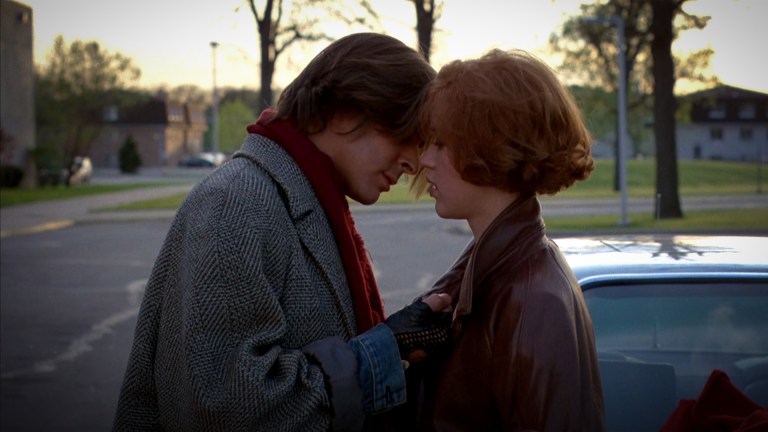
My Students Played ‘Charlie Charlie’ During Class And What We Saw Terrified Us To The Core
“Those are some nasty bite marks,” said the E.R. Nurse. She swabbed a cotton ball soaked in alcohol up and down my neck, cleaning off the bloodstains. It seared with pain, but I barely cringed.
SPONSORED

“Those are some nasty bite marks,” said the E.R. Nurse. She swabbed a cotton ball soaked in alcohol up and down my neck, cleaning off the bloodstains. It seared with pain, but I barely cringed.
“Yeah,” I said tonelessly.
“So how did you get them?” she asked, a hint of conspiratorial mischief in her voice.
I shook my head. “I’d prefer not to discuss that, if it’s alright with you.”
It’s not as if I meant to be rude. This just wasn’t her story to hear.
She shrugged, and made a few marks on the clipboard that held my chart. “Suit yourself.” Then she paused, clicked the pen up and down. “How do you spell your name again?”
“Rowanna,” I said. “R-O-W-A-N-N-A.”
She copied down the letters. “Rowanna. That’s so pretty.”
I ignored this. “And the last name is Spence, S-P-”
“Oh, I got that,” she said. “I’ll just hand this over to the doctor, and she’ll be with you in a few minutes.”
“Thanks,” I said.
She nodded, and vanished through the curtain that served as a wall.
Outside, the chatter of hospital staff and bleak machine sounds barely perforated my thoughts. I could only stare at the blank curtain in front of me, as if in a trance. I tried to cleanse my mind of whatever the fuck just happened.
It didn’t work. All it did was replay again and again, a series of disconnected silent film scenes.
And I had no choice but to watch it, over and over.
![]()
Today was supposed to be a good day. At least, my students thoughts so as they filed into the Latin Room at the beginning of fourth block. All the lights were out, and an image of a paused YouTube video projected on the big white screen at the end of the room.
“Yesssssss,” came the whispers of excitement as they found their seats, rustled their papers and books into place. “We’re watching a movie!”
I waited until 1:05 before I shut the door, as per usual. Any student who came in after would be marked late, and a victim of split-second public shaming. I took attendance: Jenna Callahan, Joseph Hitchens, Diego Menendez, Trevor Nguyen, Shelby Quinn, Erica Schultz, Nick Whattley. Only one student out of eight was absent – Claire DeVue. Doctor’s appointment, I quickly remembered. I wrote Excused by her name.
“Salvete, discipuli,” I said, formally addressing the rest of the class, the same as I did everyday. Hello, students. It didn’t sound conversational, but only because no one had conversations in Latin anymore.
“Salve, magistra,” they replied in unison, just as I’d trained them. Literally, Hello, teacher.
Even now, I still can’t believe these kids actually listen to me. This was the last class of the day, Latin IV. By now, students were supposed to be barely awake. Not this class. Only the most disciplined seniors managed to survive Latin I, II, and III without being decimated (See what I did there? Sorry, couldn’t resist). These kids were going into med school, law school, politics; any profession where knowing the archaic terminology would give them a competitive advantage. These kids took everything seriously. They attacked their studies with religious discipline, bound by a spirit of camaraderie rarely found among classmates. My duty was to lead them in their fight against a common enemy – Failure.
As their teacher, I don’t think I’m wrong to assume that my class is home to the most brilliant, most interesting students at Fox Valley High School.
Somehow, I still have trouble believing that they see me as an authority figure. I’ve always been the shortest kid in class; and as a teacher, I was still the shortest in the class. Even at age 28, I looked the same age as most of the girls in that school. To compensate for my diminutive size, I wear scary 6-inch heels that click-clack around the room in tiny, sharp steps. I have several pairs of shoes like this. Today, I wore my Louboutins – my black patent-leather Jamies with the open toe, devil-red underneath. (That was how I spent my Christmas bonus.) Needless to say, I looked intimidating.
On the downside, I know they also make my ass perk up under the black pencil skirts I always wear. I pretend to ignore the way most of the male students look at me. Instead, I try to act as un-sexy as possible. I strain my black hair into an old-lady bun every day. I wear stark librarian glasses, even though I don’t have a prescription (they’re only transparent lenses) just to discourage the more mature boys from flirting with me. Of course, it didn’t always work.
I think back to three years ago, when these same kids wandered out of their summer daze and into my classroom with blank Freshman stares. That first day of class, I asked each student to name a word with a Latin origin. They went through a fairly standard list: maximum, minimum, November, December. One kid said acrophobia.
“No, Joseph, that’s a Greek word,” I told him. “Think of a different one.”
As time went on, we’d start calling him Iosephus.
The poor kid puzzled over it for a moment. “Uhh … Rome?”
I frowned. “Fine, I’ll take that.”
Then I turned to the boy who sat next to him: a deeply-tanned kid in skinny jeans and one of those ridiculous striped v-necks, with glossy dark hair and a rakish lady-killer smile. I narrowed my eyes and frowned even deeper.
“You,” I glanced at the seating chart. “Diego, what’s a Latin word?”
“Dominatrix.”
The rest of the class laughed into their hands so they wouldn’t get in trouble. If that little shit thought he could embarrass me, he was wrong.
“Doh-mee-NAH-trix,” I corrected. “That’s how you pronounce it in Latin.”
I went to the blackboard, took a piece of chalk, and scraped out Dominatrix in my formidably neat handwriting. “Let’s break this down.”
Underneath, I wrote, Dominare (verb): to dominate; and -atrix (suffix): she who does.
“She who dominates,” I told the class. “By the end of the semester, you’ll be able to dissect nearly every Latin word, just like this.”
For the next three years, I kept my cool through all of the awkward Latin conversations. With a straight face, I told them the Latin word for “six” was sex. (Oddly enough, it has nothing to do with the fact that six was a sacred number of Venus, Roman goddess of love. I only take it as further proof that sex and love are not the same thing at all.) Eventually, they stopped giggling every time I said it. The same went for the Genitive case; and the Latin word for “old person,” which just happened to be anus (but we usually used an alternative, like veteris); or anything else that sounded vaguely anatomical. It got especially tricky when I informed them that the Latin word for “with” was cum, which actually made sense in an X-rated way (I seriously hoped my students didn’t know this, but they probably did). I required that they use the correct Latin pronunciations, though. “Old” was “AH-noose.” “With” was “KOOM,” not “come”.
I quickly learned that just one outburst of adolescent laughter could send the entire room into red-faced, oxygen-deficient chaos. Therefore, if anyone used the Anglicized (i.e., dirty) pronunciations, I threatened to hit them with the baculus – and deduct 10 points from their final semester grade. With this rule, I’ve managed to preserve order in the classroom for the past four years.
Luckily, I never had to use the baculo (Dative Case), the Latin term for “stick”. Yes, I’m talking about those old-fashioned wooden things that teachers used before they all got laser pointers. One, because corporal punishment is illegal in almost all states, and two, the threat of a whole letter grade deduction was enough to keep these young punks in line. Still, the baculus stayed propped up next to the chalkboard, a time-honored tradition of the Latin Room. That same stick had been passed down to me from the Latin teacher before me, from the Latin teacher before her – I’m not entirely sure how far back the legacy goes. I just know that I can never, ever retire the baculus; even though sometimes it really does give me the aspect of a dominatrix. To do that would be sacrilege.
Still, at least I didn’t use a laser pointer. Lasers are for entertaining cats, not educating the future of America.
Instead, today I chose to begin my lesson with a YouTube video. I waited until all of the students were settled in.
“Who among your generation,” I asked them, “knows what Monty Python is?”
A flurry of hands went up. “Good,” I said. There might still be hope for these Millennials.
Most of the hands went down in a second, except for one: Erica Schultz. Her wire-rimmed glasses caught the glare of the screen, and she looked owlishly perplexed.
“Yes, Erica, what is it?” I asked, hiding my impatience.
“Shouldn’t it be whom?” she asked.
I took a deep breath, resisting the urge to grab the baculo and javelin-toss it right through her face. “No, it’s who,” I insisted. “If you take out the prepositional phrase, ‘among your generation‘, it’s just ‘Who knows‘. Not ‘whom knows‘. You might want to check your AP Lit notes.”
“Oh,” she said, realizing her error. In an ordinary classroom, the other kids might have responded with derisive laughter, eager to humiliate anyone who stood out. My classroom, though, was a Socratic environment – more conducive to the free exchange of ideas. They debated without fear of judgment, and bullying was irrelevant.
“As I was saying,” I resumed, “you’re about to see a clip from The Life of Brian. I would just play the entire movie, except that doing so would get me fired. So, we’re only going to watch one scene today; and you’re at the point now where all the terms in this dialogue should make perfect sense to you.”
With that, I pressed play on the Romans Go Home sketch.
[youtube https://www.youtube.com/watch?v=vsawP_Ew0r4%5D
I watched as my students stared at the screen in rapt attention. They snickered as John Cleese, dressed as a Roman soldier, forcibly coerced Graham Chapman into writing a proper Latin sentence. I could see that, underneath the screen reflection dancing in their eyes, behind the impish amusement, they understood everything. Apparently, I’d succeeded in doing my job; I could barely believe it.
Then, just before the camera angle showed the completed sentence, I paused the clip.
Awwwwww, went their collective disappointed murmur.
I switched the lights back on and pressed a piece of chalk to the board.
“Now, who can write the correct answer?” I asked, surveying the class. “Anyone?”
“I got this, Miss Spence,” said an all-too-familiar voice. Of course, it would be Diego Menendez. Sliding his chair back, he strutted up to the front of the room in slick, easy steps. He’d probably grown a foot since Freshman year, and even while I wore my six-inch heels, he still smirked down at me.
“Ah, Puer Scelestus,” I said. I had Latin nicknames for most of my students. His just happened to mean “Wicked Boy,” because he never stopped looking for new ways to try my patience. It also had something to do with that time in his Sophomore year when he announced his bid to run for Governor of Illinois in 2028. That day, I also taught the class the meaning of indictment – a term which all Illinois governor-hopefuls should know.
“You’re not going to twist my arm if I get it wrong, are you?” he asked with a crooked, wry smile.
I gave him a warning glare. “Not a chance. I think I’d like to keep my job.”
He stopped in front of me and I handed him the chalk. Whether he intended it or not, his fingers brushed against mine. I pulled my hand away and swiped the chalk dust off my skirt.
“All right,” I said, “let’s see what you got.”
He checked his notebook and got right to work. I took a step back, crossed my arms, faced the rest of the class.
As much as I hate picking favorites, I must admit Diego is one of my favorites. After the Dominatrix Incident, I thought he’d turn out to be a lazy troublemaker. He proved me wrong, though. His Junior year, he constructed an entire essay on the premise that Ode I-XI (more commonly known as Carpe Diem) is actually one of the world’s oldest pick-up lines, which Horace used on a girl named Leuconoë. He also credited Horace with the original concept of “YOLO” as it related to Epicurean philosophy, and its eventual decline into hedonism.
I’d been so proud that day, I’d almost forgotten to frown. Almost.
Even now, as he finished the ear-wrenching chalk sentence, I was glad I could claim this boy as one of my own. He stepped back, eyes challenging me to find fault with his work.
Romani ite domum, it said. Romans, go home. I scanned it for errors and found none. He’d impressed me again, but he didn’t need to know that.
I narrowed my eyes. “Be honest, Diego, have you already seen this movie?”
His face went blank, genuinely surprised. “Wait, does that mean I got it right?”
“I guess we’ll find out,” I said, as if I didn’t know the answer already. “You may sit down.”
He went back to his seat, just as he was told. I shut the lights back off and resumed the clip. Sure enough, the frame zoomed out on the words “Romani ite domum” – written a hundred times in red paint. I paused the clip and closed the browser on the screen.
“It would appear so,” I said. “Good work, Puer Scelestus.”
This merited a few half-assed golf claps from the rest of the class, which died out when I turned the lights back on.
“Which leads us into the last topic we’ll cover before the Final,” I said, “my favorite case, the Imperative.”
The kids made no verbal complaint, but I could sense their disappointment. Did they really think we were going to watch movies all day? I shook my head, did a few sample exercises, and assigned the bookwork for them to do in class.
“Work on this until about 2,” I said. That gave them almost an hour. “Then we’ll check answers and I’ll give you the homework.” At which point, they’d no longer be my prisoners – until Monday, at least.
“Can we work in groups?” asked Trevor Nguyen. Usually, the boys pushed their desks into a cluster as they worked, while the girls stayed hunched over their own books in annoyed silence.
I sighed. “Yes, you may,” I said, “as long as you’re not disrupting others.”
As soon as I said this, all the boys’ desks migrated together with an ear-grating scrape against the floor. For the rest of the time, though, they stayed reasonably quiet. I worked on grading the Latin II kids’ homework, looking up now-and-then to make sure everyone was working. It seemed like I could risk being comfortable now; I took off my itchy black cardigan and hung it from the back of my chair. I relaxed, feeling much lighter in just my button-down blouse. When did I start dressing like such an old person?
After about 15 minutes, it looked like the boys had finished. Nick Whattley had his smart phone out (even though they technically weren’t allowed in classrooms, I really didn’t care if the kids used them – assuming they’d already done the work). From their scattered conversations, I could tell they were engrossed in whatever viral nonsense was trending on Vine this week. I pushed my fake glasses up and frowned.
“Guys, what is that,” I asked with too little interest to imply a question mark; I just needed to make sure they weren’t watching porn.
“Nothing,” said Whattley, a sallow scrap of a boy with a razor-thin face and shaggy blond hair. “Just some random internet game.”
I narrowed my eyes at this obvious bullshit. Of course those boys would cover for each other. If Diego ever killed someone, Whattley would help him dissolve the body in acid – and vice versa (another Latin term). Still, I wasn’t going to get up from my desk over this.
“Whatever it is, just keep your voices down,” I warned. The chatter died away.
Then I noticed Diego using his notebook as a ruler, making lines across another sheet of paper. Meanwhile, Trevor rummaged through his backpack, looking for something. He found two #2 pencils and placed them on the desk.
Now this was unusual – teenage Millennials writing with non-mechanical lead pencils. I said nothing, but watched them with suspicion. Diego scribbled something on his paper and placed the pencils in a cross, one balanced on top of the other. This seemed oddly familiar, but I didn’t know why – yet.
Still, as emotionally indifferent as I was, it gave me a bad feeling. “Guys,” I warned, “I said no disruptions.”
The boys ignored me, already focused on their game. Diego set the pencils perfectly still. Everyone paused; even the girls were watching now, from their far-removed seats.
Diego spoke, as if formally addressing someone:
“Charlie, Charlie, are you there?”
Oh, hell no! I dropped my grading pen, poised to start yelling.
“Ask it something in Latin,” said Whattley, lowering his voice – as if that would keep me from hearing him.
Diego didn’t even bother to lower his voice; he disregarded me completely. “Umquam-ne Dictatorem ero?” he asked. The other boys laughed in whispers.
Will I ever be a dictator? I shook my head. The kid definitely had no shortage of ambition.
“Okay, guys,” I said at last. “Seriously, stop.”
No one even looked at me; every student’s eyes were fixed on the pencil contrivance. I found myself watching, too – for no reason other than skeptical disdain.
At the time, my rationale on the supernatural was this: it made no difference to me either way if ghosts, demons, or any other spirit entities, actually existed. If they weren’t real, then they were the products of mass delusion, and interesting fiction material – nothing more. If they were real, though – however unlikely I thought that was – I wouldn’t fuck with them. My speculation ended there.
That is, it did, until the pencil on top started twitching. It teetered up and down, drumming on either side of the paper. The whole time, no one had touched it. I leaned forward, nerves on edge.
Then the pencil moved – across the room – and landed in the chalkboard tray on the opposite wall.
At first, I thought one of them threw it.
“Really?” I shouted, destroying their rapt silence. “Necesse vero erat-ne?” Was that really necessary? (A conversational Latin phrase I’d taught them, even though no one had conversations in Latin anymore.)
Some of the kids looked startled, as if they’d forgotten I was there.
“I didn’t throw it, I swear,” said Diego, the future politician. So, naturally, I thought he was full of shit.
I stood up and glared at every student in the room. “The next person who throws things,” I warned, “will have to stand in the corner like a preschooler, if that’s the way you’re going to act.”
“He didn’t do it, Miss Spence,” Iosephus piped up. “It moved by itself.”
Even the girls, usually unimpressed with the boys’ antics, nodded in agreement. Some of them looked genuinely afraid.
Frustrated, I hoped I could end this with my own bad temper. I slammed both my hands on the desk and everyone flinched. “Whatever. I don’t care. Just don’t do it again, or else!”
Then something clicked in the same chalk tray, far away from where anyone was sitting.
A small piece of chalk rose by itself.
“What the —” I could barely spit the words out.
The chalk – about the length of a finger bone – hovered in mid-air, swishing back and forth in a pendulous motion. Several students gasped; fear burned livid on their faces.
On its own will, the chalk wrote something on the board. The characters looked stone-carved, ancient.
SIVE QVID FIES-NE
The students read the words, tried to work out the meaning on paper.
“’Or you’ll do what?’” I translated. It sounded like a challenge. By now, I’d had enough of this bullshit. I gave the class my most withering glare. “Seriously, who the facere is doing this?!”
(In case you don’t know, the Latin verb meaning “to make” sounds a lot like “fuck”.)
“No one,” said Erica’s small, frightened voice. That girl wouldn’t lie; I don’t even think she knew how.
The animated chalk started a new message, just below the first one:
HIC EST QVOD FACIETIS
“‘You all will do,’”Sabina read, translating the verb first. “‘You will all do … this … because’?”
Close, but no cigar. It’s actually quite a challenge to translate an unfamiliar Latin sentence on sight when you haven’t already studied the words on a chart.
“’Here is what you will do,’” I corrected.
“But it’s not an imperative,” Erica argued, putting her freshly-minted knowledge into practice.
“No,” I said. “It’s stating it as a fact.”
“So what are we going to do?” Diego demanded, as a challenge to the unseen scribe. “Go on, tell us!”
Then, under the previous line, it wrote one word:
MORIETIS
No one needed to read it in English; we all knew what it meant.
You will all die.
The collective breath went out of the room; even the temperature seemed to drop. Something seemed wrong with the air, the light. We were in the presence of something just wrong.
I made one last effort to keep us rooted in the mundane, to keep the reality we knew from crumbling away.
“Whoever’s doing this,” I said in my scariest teacher voice, “this isn’t funny. It needs to stop NOW.”
Then a deep, gravity-shaking sound emanated from every corner of the room. I would say it was a laugh, but laugh is too human a term to describe it.
On their own, the lights went out. We could still see through the windows, but the lurid afternoon sun only deepened the shadows in the room. On some herd instinct, the girls left their seats for the cluster of desks. The students all huddled together, as the whites of their eyes got eerily bright in the growing darkness. I tried to stand between them and our unwanted visitor.
There was just one problem; I had no way of seeing where or what our enemy was.
The unnatural voice made another rough cackling sound, and I felt it deeper than my own heartbeat. Its words came from everywhere and nowhere; just gurgling, incoherent gibberish, which might or might not have been Latin words spelled in reverse.
The chalk still hovered in the air, as it probably had been the whole time. I never thought an innocent piece of white chalk could be so terrifying, moving by itself. It started scribbling on the board. The scribbles became a huge mass of jumbling lines.
Nick Whattley, who still had his phone out, snapped a picture of it.
“What are you doing?” cried Jenna. “Don’t take a picture of it, are you stupid?” To make her point, she smacked him in the head.
“Hey,” he protested, more annoyed than hurt. “What was that for?”
Before I could decide which one to yell at, Jenna screamed.
Just like that, their cluster dispersed. The other kids bolted as far away from Jenna and the chalk drawing as they could, nearly knocking me down. I steadied myself on a desk.
Something burned red around her neck. She dug a pendant out of her shirt collar, and I instantly saw what it was. After four years with these students, I knew most of their basic family histories. Jenna’s family was Irish-Catholic; and she wore a small crucifix on a chain around her neck.
Right now, it seemed to be blistering an imprint of itself into her skin. Her hands flew to the back of her neck, probably to undo the clasp.
“Help, Miss Spence,” she shrieked, voice rising to a scream. Her terrified eyes looked straight at me, glistening with tears. “I can’t get it off!”
Of course, hand contact between teachers and students was prohibited; but this was an exigent circumstance. I rushed up behind her, moved her hair away from her neck, and pinched the painfully small clasp open with my fingers. It burned my fingertips immediately, like my hair-straightener does whenever I accidentally touch the heated ceramic. With a sharp cry I threw it against the wall, where it burst as if held together by a string.
No longer sparkling, the silver alloy crumbled into dust. Flies swarmed from it, even though no flies could possibly have gotten in.
By this point, though, possible had a much broader meaning.











